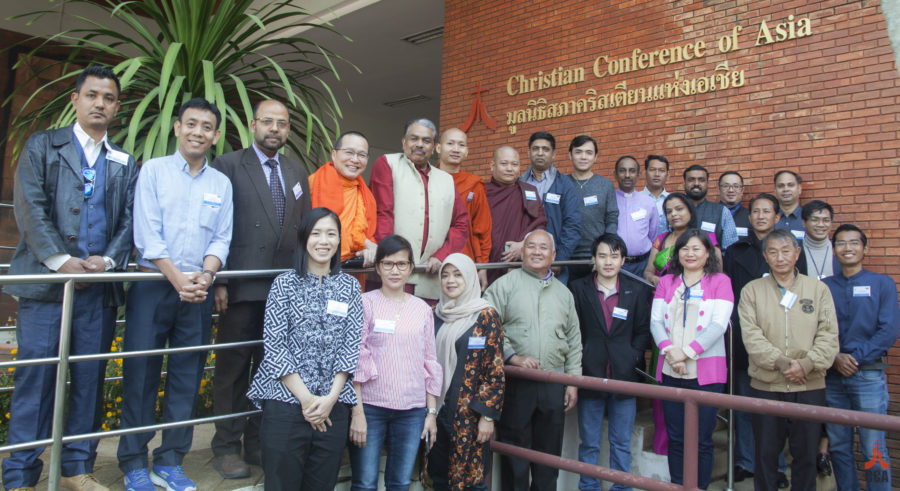Asian interfaith actions proposed at interfaith consultation on strengthening HIV and AIDS advocacy in Asia
 Participants at the Interfaith Consultation on Strengthening HIV and AIDS Advocacy in Asia
Participants at the Interfaith Consultation on Strengthening HIV and AIDS Advocacy in Asia
CHIANG MAI, Thailand: The Christian Conference of Asia (CCA) organised a regional consultation to intensify interfaith HIV and AIDS advocacy collaborations in Asia.
Held at the CCA headquarters from 27–31 January 2020, twenty-five participants representing different faith-based organisations (FBOs) and religions from Asia as well as networks of People Living with HIV and AIDS (PLHIV) attended the consultation.
In his opening address, Dr Mathews George Chunakara, the General Secretary of the CCA, stated that the interfaith consultation organised by CCA as part of its Action Together in Combatting HIV and AIDS in Asia (ATCHAA) programme was a significant move to revitalise the wider coalition of interfaith advocacy networks, especially for stimulating the activities of the Asian Interfaith Network on AIDS (AINA).
“In its efforts to strengthen HIV and AIDS advocacy, the CCA is resolute in accompanying all member constituencies and beyond, and thus the CCA is committed to facilitating the creation of interfaith and civil society networks by providing a common platform. This is to strengthen advocacy efforts to combat the spread of HIV and AIDS in Asia,” added the CCA General Secretary.
Venerable Phramaha Boonchuay Doojai, the Chairperson of AINA, said that he was grateful for this timely support of CCA. “Most people prefer not to engage in conversations around HIV and AIDS because of the discomfort and stigma surrounding it. An interfaith consultation such as this sets a positive precedent and invites other Asian faith communities and networks to work in this space,” said Venerable Boonchuay, who is a prominent Buddhist monk committed to promoting interfaith collaborative actions to combat HIV and AIDS.
Elucidating the Buddhist perspective, Venerable Boonchuay spoke of maha karuna, or ‘great compassion’. “Whoever desires to serve the Buddha should first desire to serve sick persons,” he explained. He provided numerous examples of the work of Buddhist monks in responding to HIV and AIDS in Thailand. He reported that their work had led to a reduction in infection rates, stigma and discrimination, thus impacting Thai society both directly and indirectly.
The Islamic perspective was shared by Siti Suginai, a young woman representing the Komisi Penanggulangan AIDS (KPA) in Indonesia.
“Though there is tremendous stigma around sexual freedom and drug use in traditionally conservative societies like Indonesia, Muslim communities are called upon theologically to serve the underserved,” added Suginai. Explaining the religious impetus to do so, she quoted the Quran saying that ‘whoever saves the life of one person saves the lives of all’.
Dr Ronald Lalthanmawia, Coordinator of ATCHAA, spoke on the Christian perspective and emphasised the need to stop considering HIV-AIDS as an issue of morality or sin. He called for developing an inclusive theology that was grounded in compassion, care, and support.
Sessions to share best practices and challenges saw participants make grounded, contextual, personalised, and pointed presentations for beneficial cross-learning between the countries represented.
Khawn Taung, the General Secretary of the Myanmar Interfaith Network on AIDS (MINA) shared the journey of MINA and spoke of how different faith communities had put aside their differences and collaboratively worked on issues.
Sujan Thapa, the President of the National Association of People Living with HIV in Nepal (NAP+N), informed participants about their work in addressing HIV and AIDS. PLHIV in Nepal have secured health insurance for care and treatment as a result of the organisation’s advocacy initiatives.
Wangda Dorji, from the Bhutan Network of People Living with HIV and AIDS (BNP+), which is the only civil society organisation operating to address HIV and AIDS in Bhutan, delivered a moving presentation. He shared his journey as a person living with the virus and the struggles he faced when publicly disclosing the same. He also spelt out the possibilities of reaching out to faith leaders in Bhutan who could use their respective organisations and networks to influence society and reduce stigma and discrimination.
The participants undertook an evaluation of their own organisations and institutions through an Assessment Framework which enabled them to determine the extent of their contributions in addressing HIV and AIDS.
Developing an action plan, the participants resolved to strengthen and revive national interfaith networks on AIDS, and also initiate networks in countries where they do not currently exist.










